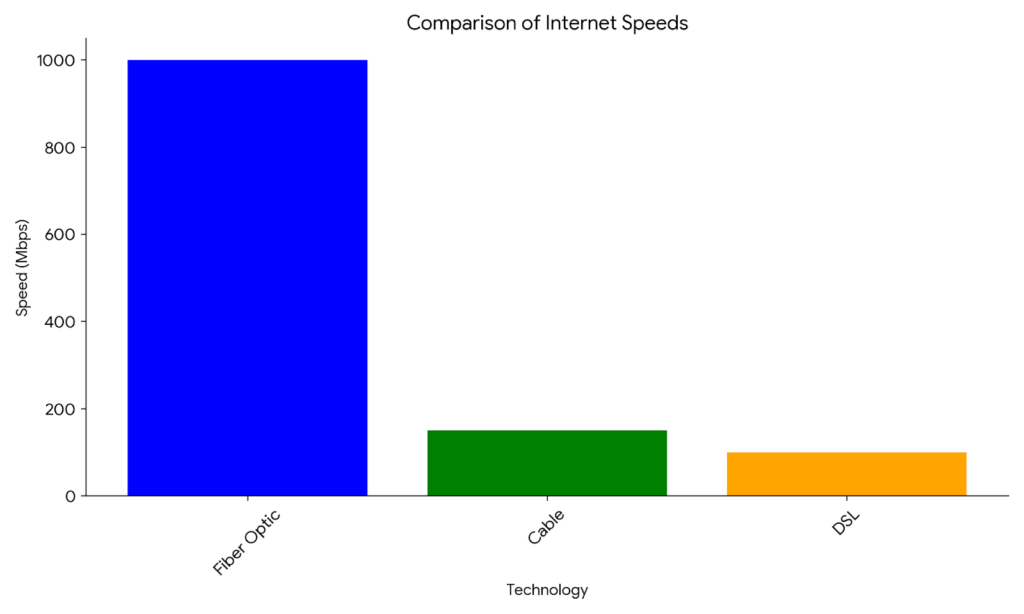In today’s fast-paced digital age, a reliable and high-speed internet connection is essential for work, entertainment, and staying connected. But remember, a slow internet connection can be a barrier to your experience. If you are tired of slow internet speeds and buffering, then you are at the right place. Because you don’t have to deal with sluggish internet anymore. That’s where gigabit fiber optic internet comes in, the champion of the internet speed race. But with so many internet options available, is gigabit fiber optic internet the right choice for you? Well, this guide will delve into the world of fiber optics. We will explore its advantages and disadvantages to help you decide if it’s the perfect fit for your needs.
What is Gigabit Fiber Optic Internet?
Gigabit fiber optic internet is also known as Fiber-To-The-Home (FTTH). It is a type of internet connection that utilizes thin strands of glass fibers to transmit data using light pulses. Unlike traditional cable internet, which relies on electrical signals traveling through copper wires. Fiber optics also offer unmatched speed, stability, and reliability.
Ultra-Fast Speeds
One of the most significant advantages of gigabit fiber optic internet is its blazing-fast speeds. With download and upload speeds of up to 1 gigabit per second (Gbps), you can:
- Download a typical 4K movie in under 5 minutes.
- Upload large files, like backing up your photo library, in minutes.
- Stream multiple high-definition videos simultaneously without buffering.
Lag-Free Gaming
For gamers, even a slight lag can mean the difference between victory and defeat. Fiber optic internet’s ultra-low latency, the time it takes for data to travel between your device and the server, eliminates frustrating lag and ensures seamless gameplay. No more jittery movements, missed shots, or disconnects during crucial moments. With fiber optic internet, you can react in real-time and dominate the competition.

| Call 866-861-4084 for Internet Deals |
The Advantages of Fiber Optics
While speed is undoubtedly the main draw, fiber optic internet offers several other advantages over traditional options:
- Reliability: Fiber optic cables are less susceptible to interference from electromagnetic waves and weather conditions, resulting in a more stable and reliable connection.
- Security: Fiber optic cables use light signals, which are much harder to steal than electrical signals used in regular copper cables. This makes it much harder for hackers to spy on your internet activity.
- Future applications: (a) It is also super important for new things like virtual reality and augmented reality. These use a lot of data, and fiber optic internet is fast enough to keep them working smoothly, without any lag. (b) It’s also important for telemedicine, which lets doctors see patients over video calls. With super fast fiber optic internet, the video quality is high, so doctors can get a good look at their patients.
Disadvantages of Fiber Optics
- Cost: Gigabit fiber optic internet plans can be more expensive than traditional cable or DSL options. However, the price difference is narrowing, and the long-term benefits of faster, more reliable internet may outweigh the initial cost.
- Availability: Fiber optic internet is not yet available in all areas. In some neighborhoods, it might take time to get installed because new cables need to be laid underground.
Here is a table showing you the pros and cons of gigabit fiber optic internet:
| Pros | Cons |
| Super-fast speeds | Can be more expensive |
| More reliable connection | Not available in all areas |
| Secure | Installation might take time in some locations |
| Future-proof | – |
Is Gigabit Fiber Optic Internet Right for You?
If you are looking for the fastest and most reliable internet connection, then gigabit fiber optic internet is the perfect choice for you. With its outstanding performance and future-proof technology, gigabit fiber optic internet is a good investment that will pay off for years to come. So, below mentioned are some factors that you need to consider before making a decision:
- Availability: Currently, fiber optic internet is not available in all areas. Check with your local internet service providers (ISPs) to see if fiber optic internet is available in your neighborhood.
- Cost: Gigabit fiber optic internet plans can be more expensive than traditional options. However, the increased speed, reliability, and future-proofing capabilities might outweigh the initial cost for some users.
- Needs: Consider your internet usage habits. If you’re a casual internet user who primarily checks email and browses the web, a lower-speed internet plan might suffice. However, if you’re a heavy internet user who streams content, and games online, or works with large files, gigabit fiber optic internet can significantly enhance your experience.
| 💡 Pro Tip: Ready to experience the future of the internet? Check to see if gigabit fiber optic internet is available in your area. Most internet service providers (ISPs) have websites where you can enter your zip code to see what plans are available. |
Fiber vs. Cable vs. DSL: Understanding the Differences
| Feature | Fiber Optic | Cable | DSL |
| Speed | Up to 1 Gbps | Up to 150 Mbps | Up to 100 Mbps (download) |
| Reliability | Very high | Moderate | Moderate |
| Latency | Very low | Moderate | High |
| Cost | Generally higher | Moderate | Lower |
| Availability | Limited | Widely available | Widely available |
| Data caps | May vary | May vary | May vary |
As you can see from the table, fiber optic internet offers significant advantages over cable and DSL in terms of speed, reliability, and latency. Below is mentioned why fiber optic internet stands out:
- Speed: Fiber optic internet offers significantly faster speeds than cable and DSL. With download speeds of up to 1 Gbps, fiber optic internet can handle even the most demanding tasks, such as streaming high-definition videos, downloading large files, and online gaming, with ease.
- Reliability: Fiber optic cables are less susceptible to interference from electromagnetic waves and weather conditions, resulting in a more stable and reliable connection. This is especially important for users who rely on their internet connection for work, school, or gaming.
- Latency: Latency refers to the time it takes for data to travel between your device and the server. Fiber optic internet has a much lower latency compared to cable and DSL. This is crucial for applications like online gaming and video conferencing, where even a slight delay can be disruptive.
Future with Gigabit Fiber Optic Internet
The world of technology is constantly evolving, and our internet needs are no exception. As we move towards a future which is filled with even more bandwidth-intensive applications like virtual reality (VR), augmented reality (AR), and cloud gaming, gigabit fiber optic internet is poised to play a pivotal role.
Here is how fiber optic internet can potentially change your digital experience:
- Unlocking the Potential of VR and AR: VR and AR experiences require massive amounts of data to deliver realistic and immersive environments. Gigabit fiber optic internet, with its ultra-fast speeds, can seamlessly stream this data, ensuring smooth visuals and minimal lag, crucial for a truly immersive experience.
- Cloud Gaming: A Lag-Free Future: Cloud gaming allows you to play high-end games without expensive consoles or powerful computers. However, it relies heavily on a reliable and high-speed internet connection. Gigabit fiber optic internet eliminates latency issues, making cloud gaming a viable and lag-free alternative to traditional gaming consoles.
- The Rise of Smart Homes: The Internet of Things (IoT) is rapidly expanding, with smart devices becoming increasingly prevalent in our homes. From smart thermostats to connected appliances, these devices require a robust internet connection to function optimally. Gigabit fiber optic internet can ensure seamless communication between these devices, creating a truly smart and connected home environment.
- Boosting Business Productivity: For businesses that rely heavily on online collaboration, video conferencing, and large file transfers. And gigabit fiber optic internet can be a game-changer in this. With its superior speed and reliability, employees can work more efficiently, improving overall productivity and business performance.
Conclusion
We hope now you know that Gigabit fiber optic internet offers a glimpse into the future of internet connectivity. With its blazing-fast speeds, unmatched reliability, and future-proofing capabilities, it can transform the way we experience the digital world. From seamless streaming and lag-free gaming to unlocking the potential of VR/AR, fiber optics covers the way for a more connected and efficient future. However, the decision to choose gigabit fiber optic internet is your own personal choice.
FAQs
Is gigabit fiber optic internet available in my area?
Availability can vary depending on your location. Contact your local internet service providers (ISPs) to inquire about fiber optic availability in your neighborhood.
Is gigabit fiber optic internet expensive?
Generally, gigabit fiber optic plans can be more expensive than traditional options. However, the increased speed, reliability, and future-proofing capabilities might outweigh the cost for some users.
What are data caps with fiber optic internet?
Not all fiber optic plans have data caps. However, some ISPs might offer tiered plans with varying data allowances. Research different plans and choose one that best suits your usage.
Is installation difficult?
The installation process for fiber optic internet can vary depending on your location and existing infrastructure. However, most ISPs handle the installation process, ensuring a smooth transition.
Is there a difference between gigabit and megabit internet speeds?
Yes, there is a significant difference. Gigabit (Gbps) refers to speeds of 1,000 Mbps (megabits per second). Traditional internet plans often offer speeds measured in Mbps, which are much slower than gigabit speeds.

Meet Jennifer Harper, a wordsmith extraordinaire who has been shaping the digital landscape with her creative prowess for the past two years. Not just a content writer; she is a storyteller who brings the content to life. Her passion for internet trends, memes, and the ever-evolving world of entertainment is evident in every piece she creates. Jennifer doesn’t just follow trends; she sets them.
